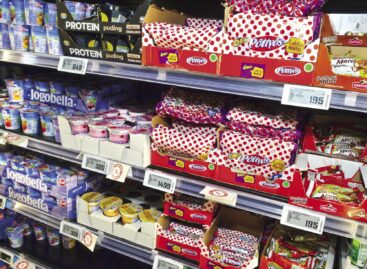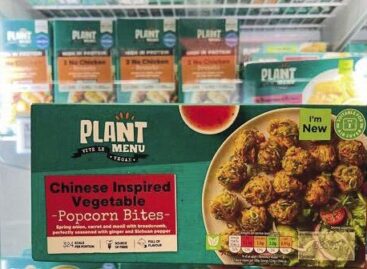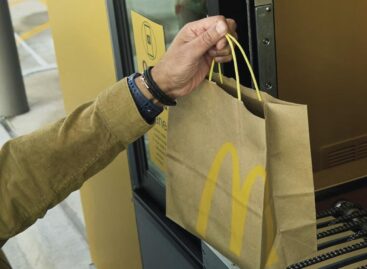Robust change in the coffee category
The battle between rising coffee bean prices and easing inflation has been won by the former: in the first half of 2025 like-for-like coffee sales declined by about 4% in volume, while price increases resulted in double-digit growth in value sales.
This article is available for reading in Trade magazin 2025/8-9.
Coffee beans (especially robusta) have a price-driving role, made evident by the fact that the largest price hikes occur in the ground and roasted coffee and whole bean segments. .

Attila Gyopár
coffee business executive officer
Nestlé Hungária
“We also see further polarisation in consumer tactics. As a result of the price rises, there is a shift towards smaller packages in certain channels, while in others products with favourable unit prices and larger formats are still dominant”,
says Attila Gyopár, coffee business executive officer of Nestlé Hungária Kft.

Réka Bánóczki
brand manager
JDE
“The strengthening of the discounter channel and the conquest of private label products continue to be the most significant trends in the domestic coffee category”,
informs Réka Bánóczki, brand manager of JDE.

Tamás Sárközi
coffee business unit manager
Coca-Cola HBC
“In the long term we expect premiumisation to remain a strong driver for the category. We can see the growing importance of out-of-home consumption”,
says Tamás Sárközi, coffee business unit manager of Coca-Cola HBC Magyarország.
Pricing in a key role
Valdo Group has observed: the momentum of private labels remains unchanged, but consumers are returning to “trusted” brands if the price-quality ratio of premium products is well communicated. .

Tímea Simon-Moldvay
head of marketing
Valdo Group
“Whole bean coffee has once again become the fastest growing segment, partly due to the “minibarista” lifestyle that emerged in the wake of working from home”,
explains head of marketing Tímea Simon-Moldvay.
Mocca Negra Zrt. always takes consumer needs into account in its pricing policy.

Attila Szűcs
key account manager
Mocca Negra
“Although this entails a decline in profit margins, a growing number of coffee consumers are choosing our value for money and premium products. As a result, in the first half of this year we recorded double-digit volume sales growth”,
we learn from key account manager Attila Szűcs.

Kata Rezsdovics
marketing manager
Nespresso
“Nowadays, coffee lovers are more cautious spenders, which is why they are looking for quality that offers them long-term enjoyment and reliability. So the premium segment – which we represent with Nespresso – isn’t losing its appeal”,
says Kata Rezsdovics, marketing manager of Nespresso in Hungary.
More and more people appreciate the work behind the brand
Segafredo Zanetti Hungária Kft., which reported a big growth in volume sales in the first half of this year (in spite of two price increases during the year), doesn’t expect any price changes in the second half of 2025.

Attila Tantó
country manager
Segafredo Zanetti
Hungária
“The trends observed last year continue to be decisive: the rise of discounters and consequently of private label coffees. Segafredo Zanetti is the strongest player in the whole bean coffee segment”,
informs country manager Attila Tantó.
At Koffein Group Kft. they believe that in the premium segment, if someone tries a product once and likes it, they tend to stick with it in the long term.

Csanád Benedek
marketing manager
Koffein Group
“This isn’t only reflected in the reorder rates, but also in the fact that more and more people appreciate the work behind freshly roasted coffee from a reliable source”,
stresses marketing manager Csanád Benedek.
The innovations of market players don’t reflect adaptation to the market situation, but rather a focus on offering special flavour experiences. This indicates that the development of coffee culture over the past years cannot be reversed. In the second half of 2025 JDE will roll out its new Omnia Fusion product line in the ground and roasted coffee and whole bean segments.
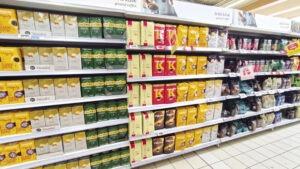
The role of coffee beans in driving up prices is demonstrated by the fact that the largest increases are in the groundand roasted, as well as the whole bean coffee segments
Education and experience with the involvement of partners
In the second half of 2025 Coca-Cola HBC Magyarország will continue to focus on close cooperation with hospitality venues, education, better seasonal offerings and the creation of location-specific offers. The goal is to enable partners to convey not only the product, but also the full value and experience behind the brands to their guests. The market for ready-to-drink coffee has been growing dynamically in recent years. Premium products by Starbucks are playing a very important role in its development.
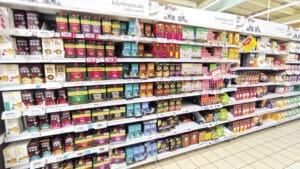
Coffee capsule portfolios are expanding both along flavours and packaging formats
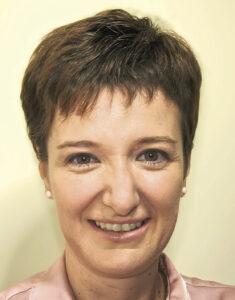
Andrea Gódor
senior trade marketing
manager
Foodnet
“According to our research, when consumers try a coffee drink for the first time or after a long break, three-quarters of them opt for a new seasonal flavour. This year we are introducing several Christmas specialties in October, following our summer limited edition Starbucks Frappuccino Sip on Sunshine”,
reports Andrea Gódor, senior trade marketing manager of Foodnet Zrt.
Premium to the maximum
In the first half of 2025 the retail distribution of Cafe Frei coffees continued to expand and sales increased compared to last year, informs managing director István Magyar.

István Magyar
managing director
Cafe Frei
“We have had a very exciting image in retail from the beginning and we try to represent other brand values as well, such as sustainability and environmental awareness”,
adds the managing director.
In the second half of the year Café Frei will come out with new Nespresso-compatible and Dolce Gusto line products in the capsule segment, plus they will introduce new flavours in the ground coffee range.
Cafe Frei has become a true “love brand” by now.
Expansion in both flavours and packaging
The growing demand for flavoured coffee has motivated Nestlé in its latest product launch: instant, caramel and hazelnut-flavoured NESCAFÉ coffees.
As for the continued demand for large packages, the company has decided to expand its capsule coffee portfolio: from this year two types of 18-capsule NESCAFÉ Farmers Origins will be available for Nespresso Original coffee machines, and a 30-capsule large pack of the extremely popular Flat White product has been introduced for the NESCAFÉ Dolce Gusto system to the Hungarian market.
In response to the growing popularity of functional beverages, Nestlé’s Nespresso division has created its Coffee+ collection, which combines coffee with an extra ingredient – ginseng extract, extra caffeine, vitamin B12 or B6 – to add a little something extra to the usual coffee experience.
By using the Nespresso Vertuo system, consumers can now make a cold brew inspired coffee drink at home. In 2025 they rolled out a special coffee capsule developed in collaboration with the Oatly oat milk brand.
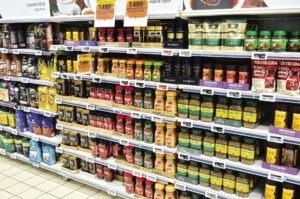
The low price of instant coffee per cup has increased in value in the eyes of consumers
Faster, greener and more convenient
As a coffee machine and beverage vending machine developer and manufacturer, for the Valdo Group the continuous innovation of its machines is a priority. All their developments are guided by three principles: energy efficiency, the latest digital solutions and reducing their environmental footprint. In the second half of the year they plan to develop the next generation of the Lumina coffee bean vending machine.
The Massimo Zanetti Beverage Group – the firm behind the Segafredo brand – is prioritising innovation, consumer demand and sustainability. In the last quarter of 2025 they are putting a new product with Bio and Fairtrade labels on the market.
Speeding up
Mocca Negra is investing lots of energy in production development. The company is speeding up, offering consumers a wide range of whole bean and ground coffees with different flavour intensities and a new look. Since 2021 they have also been manufacturing capsules for consumers who prefer convenience, and they intend to introduce flavoured versions in the near future.

Panka Orosz
head of marketing
Mocca Negra
“In the second half of the year we are focusing on building brand awareness and winning consumer attention with quality content”,
head of marketing Panka Orosz tells our magazine.

Márton Lonkai
founder and managing director
Samurai Shoelace
Samurai Shoelace Kft. has been on the market for a year and a half.
Managing director Márton Lonkai:
“The concept of “cheap coffee” doesn’t make sense anymore; a few years ago the current average price of green coffee would have been enough to buy premium specialty coffee from retailers”.
Samurai Shoelace aims to bring coffees to people’s homes that they wouldn’t otherwise be able to taste. The company is expanding the product portfolio with premium coffees and limited editions of specialties.
Quality starts with water
Koffein Group’s basic philosophy is to maintain a good relationship with its partners: they constantly monitor their feedback and respond quickly and flexibly in all cases. This year water quality has become a very important focus area for the company. Hard water is a serious problem in several regions of Hungary: it accelerates the depreciation of coffee machines and impairs the taste and aroma of the brew.
Koffein Group is addressing this challenge by introducing water softening systems.
The Brando Group has great experience in the HoReCa segment, but the development of its retail portfolio has also entered its final phase.
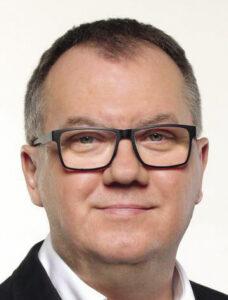
Kornél Kúti
key account manager
Brando Group
“With our new products we wish to bring fresh and distinctive flavours to the domestic coffee market. Our own roasting plant has one of the biggest capacities in the region and offers significant growth potential. At the moment building the Brando brand and strengthening its market position are our top priorities”,
reports key account manager Kornél Kúti.
Power in beans: the conquest of whole bean coffee
According to the NIQ retail index, 22,000 tonnes of coffee in the value of more than HUF 130.5bn landed in shopping baskets between June 2024 and May 2025.


Guest writer:
Zsófia Égi
analytic insights
associate
NIQ
This represents an 8% rise in value compared to the same period last year, while sales in kilogram were down 4%. Although sales of manufacturer brands increased in value, they saw a decline in volume. In contrast, private labels grew more dynamically in value, gaining 2 percentage points to account for nearly a quarter of the market. Ground coffee continues to lead the market with a 30% share, up 2 percentage points from the previous period. However, this segment suffered a double-digit decline in volume sales. Capsule coffee remained in second place with a 22% share. Whole bean coffee came in third place, increasing its market share by 2 percentage points to generate nearly a fifth of sales. Moreover, unlike ground coffee, whole bean coffee also grew in volume.
Dropping consumption, but premium coffee is on the rise: changing habits behind the cup
Over the past year we drank less coffee than we had done a year earlier. According to May 2025 MAT data, the coffee market declined by nearly 4% in number of cups consumed, but value sales were up by 8.4%.


Guest writer:
József Scheiling
business development
lead
YouGov®
The number of coffee buyers didn’t change much in the past year: 93 out of 100 households purchased coffee. However, the frequency of purchases declined, as households bought coffee 11.7 times, compared to nearly 13 times three years ago. As regards sales channels, sales volumes increased in drugstores (EcoFamily, DM, Rossmann) and online. Sales didn’t grow in discounters, while the volume sold in hypermarkets actually fell by 20%. In the May 2025 MAT period the average price of a cup of coffee rose by nearly 13% across the entire market.
Ground coffee – the largest segment and the second cheapest per cup – was once again purchased by fewer people last year, resulting in a further decline in volume (by more than 10% if measured in cups). More and more people bought whole bean coffee, nearly 7% more than a year earlier. The popularity of capsule coffee continued to grow, as Nespresso-compatible capsules were purchased by 9% more households last year than in the previous year. Single-component traditional instant coffee is the third biggest segment on the market after ground coffee and whole bean coffee. Its volume sales decreased by 6.4% in one year, due to a decline in both purchase frequency and the quantity bought per occasion.
Related news
There is a slice for everyone
🎧 Hallgasd a cikket: Lejátszás Szünet Folytatás Leállítás Nyelv: Auto…
Read more >Related news
State compensation for the victims of Bászna Gabona Zrt. has been completed
🎧 Hallgasd a cikket: Lejátszás Szünet Folytatás Leállítás Nyelv: Auto…
Read more >József Viski: Adaptation and competitiveness are key for the horticultural sector
🎧 Hallgasd a cikket: Lejátszás Szünet Folytatás Leállítás Nyelv: Auto…
Read more >Festival buzz at the 60th anniversary EuroShop trade fair
🎧 Hallgasd a cikket: Lejátszás Szünet Folytatás Leállítás Nyelv: Auto…
Read more >


